Absent supermarkets in the late 19th century, the average American family raised chickens as a matter of necessity- if you wanted fresh eggs, you raised chickens, if you wanted roast chicken for dinner, you raised chickens. While it may no longer be necessary to grow one’s own food, countless families around the United States want to, but are forced to wage battles against zoning departments and municipalities for the right keep chickens.
How did we get to a place where raising backyard chickens is illegal in many jurisdictions? Being an attorney, I have a theory based in the history of zoning law, which will be important to understand if you need to fight lawmakers for the right to keep chickens in your town as I have.
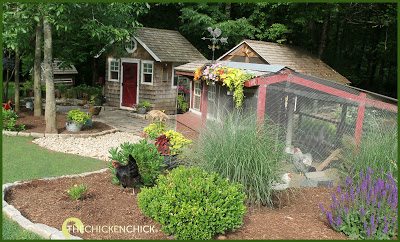
The concept of land use zoning was largely non-existent in this United States at the beginning of the 20th century, but it quickly became the norm. “Zoning’s original purpose was to protect homeowners in residential areas from devaluation by industrial and apartment uses that had been made footloose by trucks and buses around 1910-1920.”¹
Most zoning codes are “permissive use” regulations—in other words, if the code does not specifically state that you are allowed to use your land for a certain purpose, you cannot use your land for that purpose. Nobody wants a developer plunking a high-rise apartment behind their backyard or a funeral home in the lot next door.
Most zoning codes contain no provisions sanctioning the raising of chickens as a permitted residential land use because zoning was intended to protect private property values from being adversely affected by undesirable commercial uses and because our forebearers never could have imagined a time when permission would be needed to feed their families food they grew or raised. Not only was permission not required under the law, the government promoted it, encouraging families that did not already keep chickens during World War I to keep chickens as a patriotic duty!

Many municipalities have added backyard chicken keeping as a permitted use on residential properties to their zoning codes. As of 2011, 93% of US cities allowed raising of backyard chickens including, New York, Denver and Los Angeles. In fact, a follower of mine on Facebook kept chickens on the veranda of his Manhattan’s Upper West Side apartment in a custom-built coop that was included as a selling feature in the real estate listing of his 730 square foot apartment as a selling incentive at its cool $1.2 million dollar asking price. Sadly, many municipalities still don’t get it, including mine until relatively recently.


I was a chicken outlaw in a farm town.
My neighbor kept three horses and about a dozen chickens on a lot the same size as mine, so when she encouraged me to become a chickeneer too, it never occurred to me that it might not be legal to keep chickens in our neighborhood. The moment my sexed pullet, Petunia, crowed, a different neighbor was on the phone complaining to the zoning department. I learned that keeping chickens was illegal in our town through a Cease and Desist letter sent by the zoning enforcement officer.

Over a period of several years, I defended two Cease & Desist letters and a lawsuit brought by the town seeking to force me to get rid of my chickens. As a bar-admitted attorney, the fight didn’t ruffle my feathers, but the legal battle was a costly time drain. I ultimately beat City Hall and, with the lawsuit in the rear-view mirror, I led the charge to legalize chickens in my town, succeeding in spite of persistent political resistance.

ARE CHICKENS LEGAL IN YOUR AREA?
Suffice it to say, it’s a good idea to determine whether chickens can be kept legally on your property before jumping into the hobby with both feet. The rules that govern chicken-keeping are different in every jurisdiction. If possible, consult a local attorney who practices municipal law in your town or read the zoning regulations and municipal codes that apply to your specific property, including health codes, noise ordinances, and roaming animal laws. Building officials, zoning enforcement officials and land records clerks will ordinarily help residents determine their property zone and applicable regulations, but read the documents yourself to see what it says- or doesn’t say about keeping chickens in your zone. If the zoning code doesn’t say anything about backyard chickens, do not assume you are allowed to keep chickens! A zoning code that says nothing about keeping backyard chickens in a residential zone is a prohibition on chicken keeping in that zone.
If chickens are permitted on your property, additional issues to investigate include any limit on the number of chickens, rooster restrictions, any permit requirements, waste management regulations, and coop location specifics such as setbacks from neighboring property lines, streets, or homes. In addition, most homeowner associations have bylaws that govern animal-keeping—be sure to read them.
If you choose not to comply with regulations that prohibit keeping chickens, acknowledge the potential consequences of getting busted and, in fairness to the chickens, have an exit strategy.
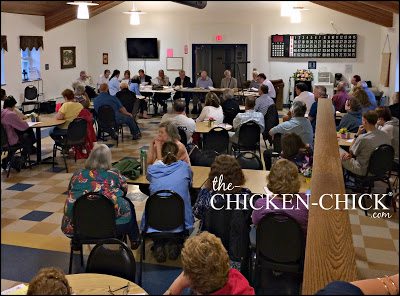
(Standing room only crowd at the public hearing. (see video below)
CHANGE THE LAW
If your jurisdiction does not permit chicken-keeping and you’d like to pursue a change in the law, expect to pay a fee to accompany the paperwork required to petition the city/town council or the application to the zoning commission. The process is different in every jurisdiction, but a public hearing date is ordinarily set after specific notice of the application is provided to the general public. Don’t count on making an appeal to lawmakers’ common sense— our society has become so far removed from raising our own food that most have no idea what raising a small flock involves. Say the word “chickens” to most lawmakers- or most folks on the street, for that matter- and visions of Frank Purdue’s meat bird horror show comes to mind: the crowded poultry house, the stench, the deplorable living conditions. Understand that you will need to educate lawmakers and your community about backyard chickens, how they are kept and why the most common misconceptions are unwarranted.

(Suffield, CT Zoning Commission)
KNOW YOUR AUDIENCE
I found it useful to learn the lawmakers’ backgrounds and biases. I recommend attending a public hearing to observe personalities and meeting protocols, then preparing a strategy to debunk the usual misconceptions with persuasive evidence about housing, behaviors and neighborhood impact. You will want to demonstrate how silly it is to micromanage pet chickens by gathering data to compare how dogs are regulated in your municipality. Email animal control officials, police department administrators and zoning enforcement officials requesting annual complaint statistics about barking and roaming dogs and any comparable chicken complaints.
PRO TIP: Make written requests to local law enforcement and zoning officials for statistics relative to annual chicken-related noise complaints compared to barking dog noise complaints. An email with the subject line, “Freedom of Information Request” can be expected to garner prompt compliance.
Lawmakers are typically receptive to public pressure- encourage neighbors, local officials, news outlets, and animal advocacy groups to attend hearings and email officials in support of your application. Social media is an invaluable tool for communicating with and acquiring supporters to attend hearings. Invite local and state agriculture experts and university poultry extension service specialists to hearings to address lawmakers’ concerns.
PRO TIP: Determine whether special permission is required for a non-resident expert to testify at the hearing before inviting experts to speak in support of your petition.
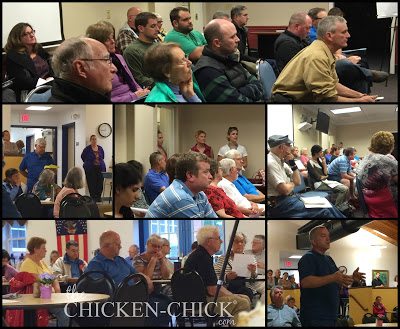
THE PUBLIC HEARING
When you are finally ready to make your argument at the public hearing, present facts and statistics to deflate same, tired arguments the opposition always makes and submit copies of any supporting documents to each lawmaker during the meeting to ensure they become part of the permanent record. Also, dress appropriately- don’t wear tee shirts, ballcaps, shorts, or overalls if you want to be taken seriously. You will want to explain to them how the history of zoning laws has played a role in the status of backyard chicken keeping

Sadly, you will have to explain to lawmakers why and how millions of people keep backyard chickens responsibly. They will likely have difficulty wrapping their heads around the idea that chickens are kept as pets, and that they enrich the lives of their caretakers in the same way as dogs and cats. Prepare for snickers and forge ahead with the arguments supported by indisputable evidence.
(Video recording of my argument before the Suffield, CT Zoning Commission.)
WHY KEEP CHICKENS?
Fresh Eggs from Humanely Raised Hens
Home-raised hens living in spacious, clean conditions produce eggs that are fresher, better-tasting, and often more nutritious than their commercially farmed counterparts. Raising chickens also promotes the humane treatment of food-producing animals and a local, sustainable food system.

Pets, Companions, and Therapy Animals
Pet chickens are a hobby for most modern day keepers; they provide companionship, entertainment, stress reduction, and comic relief, features that set today’s chickens apart from our forebears’ flocks. They are not livestock that are relegated to the Sunday soup pot when they are injured any more than we would think to eat our dogs or cats. They are appreciated for their distinct personalities and their curious social interactions with each other. Pet chickens are routinely used as therapy animals for individuals with a wide array of emotional, physical, and other life challenges, as well as visitors to the elderly in health and retirement facilities.
Education
Backyard chickens are a living lesson to children that eggs do not magically appear in cartons and a chicken does not originate from the supermarket freezer section in nugget form. Chickens provide opportunities for children to understand where food comes from and contribute to its production. Watering, feeding, and egg-collecting are all chores children can manage while experiencing valuable life lessons in responsibility, the circle of life, and compassion for animals.
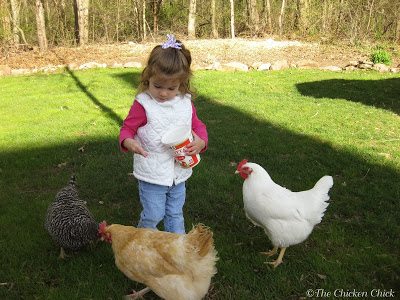
Organic Gardeners and Exterminators
Chickens are green pets. They eat a variety of weeds and disease-carrying insects, making backyards and water supplies safer than those where toxic insecticides and pesticides are routinely applied. Given the opportunity, they gladly till, turn, aerate, and enrich gardens with homemade, nitrogen-rich fertilizer.

MYTHS AND FACTS ABOUT BACKYARD CHICKENS
When arguing your case to lawmakers, take the wind out of the opposition’s sails before they even get a chance to speak by dispelling the commonly held misconceptions. The opposition’s arguments will be driven by emotion and fear of the unfamiliar, while the facts will speak for themselves.
Myth: Chickens are dirty and smelly.
Fact: Chickens spend hours each day dust bathing and meticulously preening themselves to maintain good hygiene. Chickens do not smell—animal waste smells. All animal waste smells. When managed properly, no odors emanate from a chicken yard.
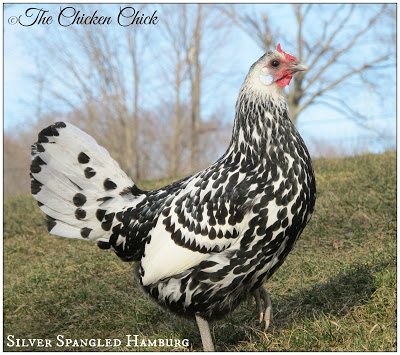
Compared to dogs, chickens produce valuable waste that can be used as a valuable garden amendment. Five hens produce approximately five ounces of valuable garden fertilizer daily compared to the average dog that generates approximately twelve ounces of pathogenic, unusable feces a day.
Myth: Chickens hurt property values.
Facts: Chicken-keepers view their coops, flocks and yards as a source of pride, landscaping and tending to their cleanliness fastidiously. There has never been any evidence supporting the claim that backyard chickens hurt property values, in fact, the opposite has proven true. A Forbes list of the Top 10 US housing markets appreciating in value showed all ten permit chicken-keeping!

Myth: Chickens are noisy.
Facts: Hens are not ordinarily noisy and roosters are no noisier in volume or frequency than barking dogs.
Barking dog at 1 meter = 70–100dB
Lawnmower at 1 meter = 107 dB
Rooster at 1 meter = 48 dB
Intermittent daytime noises are a normal part of living in any community and regulations should not discriminate against any species or gender within a species. Nobody is entitled to live in a silent neighborhood. Any concerns about chicken noises should be addressed in the same manner other noise complaints are addressed, including barking dog noise.
Myth: Chickens require a lot of land.
Fact: Chickens require no acreage to be well kept. Residents of all major US cities- including, New York, Denver and Los Angeles- keep chickens with no acreage at all. The number a family could responsibly raise in a backyard is ordinarily much more than most families wish to keep.

Myth: Chickens attract rodents and predators.
Facts: Wild animals and rodents reside in every neighborhood and are attracted to food sources such as seed in wild bird feeders and garbage cans. Concerns related to attracting rodents and predators should be addressed by restricting wild bird feeders, which entice rodents, bears and wild birds into yards where they can transmit diseases.
Skunks, raccoons, and other wild animals frequent backyards regardless of whether chickens also occupy those yards. Chicken keepers are simply more aware of the threat predators pose to their pets than the average homeowner because we spend a lot of money implementing safeguards to prevent losses to them.
Myth: Chickens are kept only for egg production, therefore limits on flock size should be calculated by the number of eggs a family needs.
Facts: Chickens are kept for many reasons: for eggs, as pets, therapy animals, hobby show birds, 4-H project animals, for egg color variations and to preserve heritage breeds in danger of extinction.
Most hens do not lay an egg every day. All hens are affected by seasonal lighting changes, stress, and age, peaking in productivity in their first two years of egg-laying. Chicks hatched this spring may produce no eggs during autumn and winter of their third year.
A chicken-counting provision will only create enforcement problems and frustrate one of the primary purposes of keeping chickens, which is egg production. There is no rational justification for placing arbitrary limits on head counts- it’s expensive to keep pet chickens and hen hoarding is not endemic to the backyard chicken keeping community. The irony in most jurisdictions is that regulations ultimately have little effect on the number of backyard flocks kept- untold numbers of chickens fly under the municipal authority radar, living lives of luxury in backyards completely unnoticed.
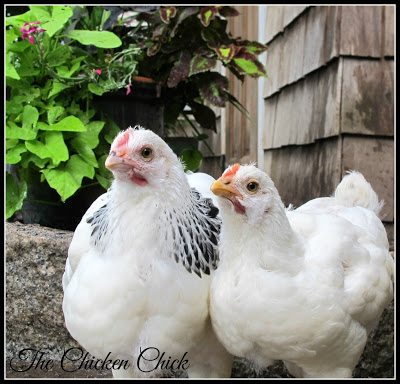
ENCOURAGE SENSIBLE REGULATION
Lamentably, lawmakers attempt to include random controls over aspects of backyard chicken keeping that have never been a problem in the jurisdiction (such as food storage or waste management) simply because they do not understand what keeping a small flock of chickens entails. Overbearing regulations cause confusion, create administrative burdens and the need for enforcement by municipal officials unfamiliar with small flock management norms.
Enforcement of any chicken keeping regulation is an important consideration, but potential problems contemplated in this context usually already fall under the jurisdictions of animal control officials, police and health departments. Nuisance and health codes ordinarily address smell, noise, and other sanitation concerns. There is no need to enact a complicated, overly restrictive regulation based on unfounded fears of the unknown. There will always be abuses of any standard, but a few theoretical bad actors should not give rise to regulations that micro-manage pets.
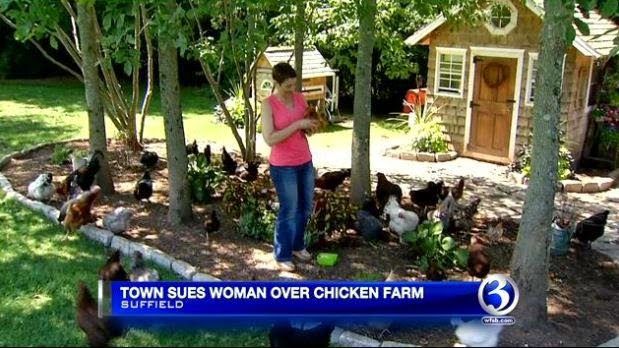
MY CHICKEN OUTLAW STORY, The Reader’s Digest Version
2008 My neighbor kept three horses and about a dozen chickens on a lot the same size as mine, so when she encouraged me to join the ranks of chickenistas, it never occurred to me that it might not be legal to keep chickens in our neighborhood.
2009 When my sexed pullet, Petunia, first crowed, a different neighbor immediately got on the phone to the zoning department officials to complain. I first learned that keeping chickens was illegal in our town through the Cease and Desist letter sent to us by the zoning enforcement officer. The resolution of that complaint was a signed agreement with the neighbor (and filed in the zoning office) stating that they had no objection to our hens or roosters provided the roosters were kept in the coop until 7:30 am. The Zoning Enforcement Officer withdrew the 2009 Cease and Desist order as a result of the agreement. For years we went beyond that agreement, keeping the rooster in the basement or garage until 9 am. The neighbors visited our coop and chicken yard, and enjoyed gifts of our eggs. There had never been any other problems, issues or bad blood between us and the neighbors.
10/16/12 The town issued permits for all three of our coops, which were approved by the Zoning Enforcement Officer, Health Department, Building Department and Wetlands Department (after two separate inspections prompted by the neighbor’s false complaints of odors, rodents and flies).
6/18/13 At some point, the neighbor decided the agreement no longer suited them and complained to the town again and the town issued a second Cease & Desist letter to remove our flock from our yard. (don’t even get me started on this one!) It bears noting that the only other complaints received by the Zoning Enforcement Officer came by phone and email from blogger Lisa Steele of Fresh Eggs Daily who testified under oath in a defamation lawsuit deposition (that can be read here) that she called my town’s zoning official.
1/27/14 When we refused to remove our chickens from our yard, the town sued us in Connecticut civil court.

September, 2014: I argued an application to amend the zoning code language to expressly permit hobby farms and backyard chickens. The actual hearing can be seen here. After the zoning commission denied my petition to legalize chickens in 2014, the town moved forward with its lawsuit. The story broke in the newspaper and television stations. One local news station was so anxious to scoop the story that they knocked on my door unannounced.
THE END OF THE LAWSUIT
On November 12, 2014, we purchased three acres of completely useless wetlands (with the funds raised from selling pink flamingos) from a very reluctant property owner who had not been the least bit interested in selling the land. The additional 3 acres of swampland qualified our property to be classified as a “farm” under the zoning code. We can now have a herd of cattle, a pig ranch, a horse farm, even a rooster sanctuary- all on the same exact 2.17 acres of land we started with. The insanity of this municipal charade is that we still only use approximately 1/4 acre of our original 2.17 acres of property for keeping chickens. Nothing has changed about the character, size or fitness of our property for keeping chickens as a result of the land purchase.

In February, 2015, the town of Suffield Withdrew their lawsuit against us and issued the following court-ordered apology letter.
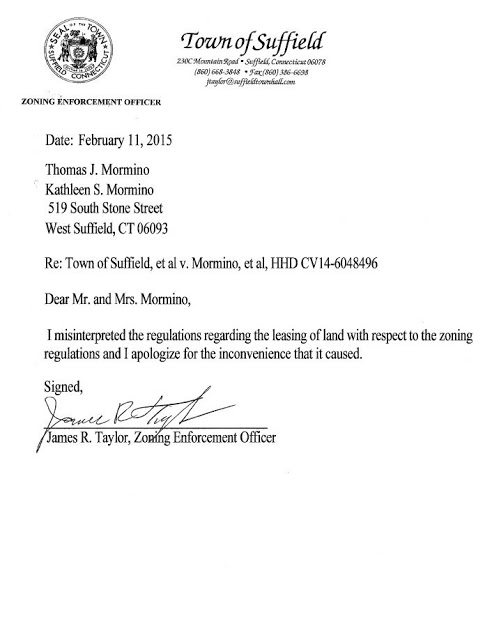
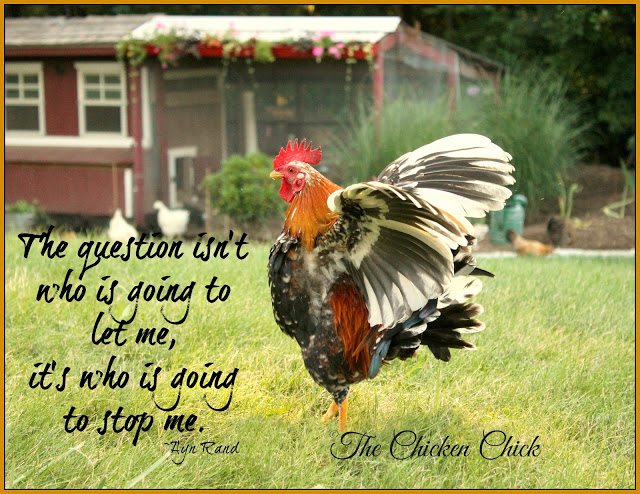
Additional reading and citations available upon request
1 An Economic History of Zoning and a Cure for Its Exclusionary Effects, Issue 2, Part 3 of Working paper series (Dartmouth College. Department of Economics) William A. Fischel, 2001

Kathy Shea Mormino
Affectionately known internationally as The Chicken Chick®, Kathy Shea Mormino shares a fun-loving, informative style to raising backyard chickens. …Read on


shop my SPONSORS
Absent supermarkets in the late 19th century, the average American family raised chickens as a matter of necessity- if you wanted fresh eggs, you raised chickens, if you wanted roast chicken for dinner, you raised chickens. While it may no longer be necessary to grow one’s own food, countless families around the United States want to, but are forced to wage battles against zoning departments and municipalities for the right keep chickens.
How did we get to a place where raising backyard chickens is illegal in many jurisdictions? Being an attorney, I have a theory based in the history of zoning law, which will be important to understand if you need to fight lawmakers for the right to keep chickens in your town as I have.

The concept of land use zoning was largely non-existent in this United States at the beginning of the 20th century, but it quickly became the norm. “Zoning’s original purpose was to protect homeowners in residential areas from devaluation by industrial and apartment uses that had been made footloose by trucks and buses around 1910-1920.”¹
Most zoning codes are “permissive use” regulations—in other words, if the code does not specifically state that you are allowed to use your land for a certain purpose, you cannot use your land for that purpose. Nobody wants a developer plunking a high-rise apartment behind their backyard or a funeral home in the lot next door.
Most zoning codes contain no provisions sanctioning the raising of chickens as a permitted residential land use because zoning was intended to protect private property values from being adversely affected by undesirable commercial uses and because our forebearers never could have imagined a time when permission would be needed to feed their families food they grew or raised. Not only was permission not required under the law, the government promoted it, encouraging families that did not already keep chickens during World War I to keep chickens as a patriotic duty!

Many municipalities have added backyard chicken keeping as a permitted use on residential properties to their zoning codes. As of 2011, 93% of US cities allowed raising of backyard chickens including, New York, Denver and Los Angeles. In fact, a follower of mine on Facebook kept chickens on the veranda of his Manhattan’s Upper West Side apartment in a custom-built coop that was included as a selling feature in the real estate listing of his 730 square foot apartment as a selling incentive at its cool $1.2 million dollar asking price. Sadly, many municipalities still don’t get it, including mine until relatively recently.


I was a chicken outlaw in a farm town.
My neighbor kept three horses and about a dozen chickens on a lot the same size as mine, so when she encouraged me to become a chickeneer too, it never occurred to me that it might not be legal to keep chickens in our neighborhood. The moment my sexed pullet, Petunia, crowed, a different neighbor was on the phone complaining to the zoning department. I learned that keeping chickens was illegal in our town through a Cease and Desist letter sent by the zoning enforcement officer.

Over a period of several years, I defended two Cease & Desist letters and a lawsuit brought by the town seeking to force me to get rid of my chickens. As a bar-admitted attorney, the fight didn’t ruffle my feathers, but the legal battle was a costly time drain. I ultimately beat City Hall and, with the lawsuit in the rear-view mirror, I led the charge to legalize chickens in my town, succeeding in spite of persistent political resistance.

ARE CHICKENS LEGAL IN YOUR AREA?
Suffice it to say, it’s a good idea to determine whether chickens can be kept legally on your property before jumping into the hobby with both feet. The rules that govern chicken-keeping are different in every jurisdiction. If possible, consult a local attorney who practices municipal law in your town or read the zoning regulations and municipal codes that apply to your specific property, including health codes, noise ordinances, and roaming animal laws. Building officials, zoning enforcement officials and land records clerks will ordinarily help residents determine their property zone and applicable regulations, but read the documents yourself to see what it says- or doesn’t say about keeping chickens in your zone. If the zoning code doesn’t say anything about backyard chickens, do not assume you are allowed to keep chickens! A zoning code that says nothing about keeping backyard chickens in a residential zone is a prohibition on chicken keeping in that zone.
If chickens are permitted on your property, additional issues to investigate include any limit on the number of chickens, rooster restrictions, any permit requirements, waste management regulations, and coop location specifics such as setbacks from neighboring property lines, streets, or homes. In addition, most homeowner associations have bylaws that govern animal-keeping—be sure to read them.
If you choose not to comply with regulations that prohibit keeping chickens, acknowledge the potential consequences of getting busted and, in fairness to the chickens, have an exit strategy.

(Standing room only crowd at the public hearing. (see video below)
CHANGE THE LAW
If your jurisdiction does not permit chicken-keeping and you’d like to pursue a change in the law, expect to pay a fee to accompany the paperwork required to petition the city/town council or the application to the zoning commission. The process is different in every jurisdiction, but a public hearing date is ordinarily set after specific notice of the application is provided to the general public. Don’t count on making an appeal to lawmakers’ common sense— our society has become so far removed from raising our own food that most have no idea what raising a small flock involves. Say the word “chickens” to most lawmakers- or most folks on the street, for that matter- and visions of Frank Purdue’s meat bird horror show comes to mind: the crowded poultry house, the stench, the deplorable living conditions. Understand that you will need to educate lawmakers and your community about backyard chickens, how they are kept and why the most common misconceptions are unwarranted.

(Suffield, CT Zoning Commission)
KNOW YOUR AUDIENCE
I found it useful to learn the lawmakers’ backgrounds and biases. I recommend attending a public hearing to observe personalities and meeting protocols, then preparing a strategy to debunk the usual misconceptions with persuasive evidence about housing, behaviors and neighborhood impact. You will want to demonstrate how silly it is to micromanage pet chickens by gathering data to compare how dogs are regulated in your municipality. Email animal control officials, police department administrators and zoning enforcement officials requesting annual complaint statistics about barking and roaming dogs and any comparable chicken complaints.
PRO TIP: Make written requests to local law enforcement and zoning officials for statistics relative to annual chicken-related noise complaints compared to barking dog noise complaints. An email with the subject line, “Freedom of Information Request” can be expected to garner prompt compliance.
Lawmakers are typically receptive to public pressure- encourage neighbors, local officials, news outlets, and animal advocacy groups to attend hearings and email officials in support of your application. Social media is an invaluable tool for communicating with and acquiring supporters to attend hearings. Invite local and state agriculture experts and university poultry extension service specialists to hearings to address lawmakers’ concerns.
PRO TIP: Determine whether special permission is required for a non-resident expert to testify at the hearing before inviting experts to speak in support of your petition.

THE PUBLIC HEARING
When you are finally ready to make your argument at the public hearing, present facts and statistics to deflate same, tired arguments the opposition always makes and submit copies of any supporting documents to each lawmaker during the meeting to ensure they become part of the permanent record. Also, dress appropriately- don’t wear tee shirts, ballcaps, shorts, or overalls if you want to be taken seriously. You will want to explain to them how the history of zoning laws has played a role in the status of backyard chicken keeping

Sadly, you will have to explain to lawmakers why and how millions of people keep backyard chickens responsibly. They will likely have difficulty wrapping their heads around the idea that chickens are kept as pets, and that they enrich the lives of their caretakers in the same way as dogs and cats. Prepare for snickers and forge ahead with the arguments supported by indisputable evidence.
(Video recording of my argument before the Suffield, CT Zoning Commission.)
WHY KEEP CHICKENS?
Fresh Eggs from Humanely Raised Hens
Home-raised hens living in spacious, clean conditions produce eggs that are fresher, better-tasting, and often more nutritious than their commercially farmed counterparts. Raising chickens also promotes the humane treatment of food-producing animals and a local, sustainable food system.

Pets, Companions, and Therapy Animals
Pet chickens are a hobby for most modern day keepers; they provide companionship, entertainment, stress reduction, and comic relief, features that set today’s chickens apart from our forebears’ flocks. They are not livestock that are relegated to the Sunday soup pot when they are injured any more than we would think to eat our dogs or cats. They are appreciated for their distinct personalities and their curious social interactions with each other. Pet chickens are routinely used as therapy animals for individuals with a wide array of emotional, physical, and other life challenges, as well as visitors to the elderly in health and retirement facilities.
Education
Backyard chickens are a living lesson to children that eggs do not magically appear in cartons and a chicken does not originate from the supermarket freezer section in nugget form. Chickens provide opportunities for children to understand where food comes from and contribute to its production. Watering, feeding, and egg-collecting are all chores children can manage while experiencing valuable life lessons in responsibility, the circle of life, and compassion for animals.

Organic Gardeners and Exterminators
Chickens are green pets. They eat a variety of weeds and disease-carrying insects, making backyards and water supplies safer than those where toxic insecticides and pesticides are routinely applied. Given the opportunity, they gladly till, turn, aerate, and enrich gardens with homemade, nitrogen-rich fertilizer.

MYTHS AND FACTS ABOUT BACKYARD CHICKENS
When arguing your case to lawmakers, take the wind out of the opposition’s sails before they even get a chance to speak by dispelling the commonly held misconceptions. The opposition’s arguments will be driven by emotion and fear of the unfamiliar, while the facts will speak for themselves.
Myth: Chickens are dirty and smelly.
Fact: Chickens spend hours each day dust bathing and meticulously preening themselves to maintain good hygiene. Chickens do not smell—animal waste smells. All animal waste smells. When managed properly, no odors emanate from a chicken yard.

Compared to dogs, chickens produce valuable waste that can be used as a valuable garden amendment. Five hens produce approximately five ounces of valuable garden fertilizer daily compared to the average dog that generates approximately twelve ounces of pathogenic, unusable feces a day.
Myth: Chickens hurt property values.
Facts: Chicken-keepers view their coops, flocks and yards as a source of pride, landscaping and tending to their cleanliness fastidiously. There has never been any evidence supporting the claim that backyard chickens hurt property values, in fact, the opposite has proven true. A Forbes list of the Top 10 US housing markets appreciating in value showed all ten permit chicken-keeping!

Myth: Chickens are noisy.
Facts: Hens are not ordinarily noisy and roosters are no noisier in volume or frequency than barking dogs.
Barking dog at 1 meter = 70–100dB
Lawnmower at 1 meter = 107 dB
Rooster at 1 meter = 48 dB
Intermittent daytime noises are a normal part of living in any community and regulations should not discriminate against any species or gender within a species. Nobody is entitled to live in a silent neighborhood. Any concerns about chicken noises should be addressed in the same manner other noise complaints are addressed, including barking dog noise.
Myth: Chickens require a lot of land.
Fact: Chickens require no acreage to be well kept. Residents of all major US cities- including, New York, Denver and Los Angeles- keep chickens with no acreage at all. The number a family could responsibly raise in a backyard is ordinarily much more than most families wish to keep.

Myth: Chickens attract rodents and predators.
Facts: Wild animals and rodents reside in every neighborhood and are attracted to food sources such as seed in wild bird feeders and garbage cans. Concerns related to attracting rodents and predators should be addressed by restricting wild bird feeders, which entice rodents, bears and wild birds into yards where they can transmit diseases.
Skunks, raccoons, and other wild animals frequent backyards regardless of whether chickens also occupy those yards. Chicken keepers are simply more aware of the threat predators pose to their pets than the average homeowner because we spend a lot of money implementing safeguards to prevent losses to them.
Myth: Chickens are kept only for egg production, therefore limits on flock size should be calculated by the number of eggs a family needs.
Facts: Chickens are kept for many reasons: for eggs, as pets, therapy animals, hobby show birds, 4-H project animals, for egg color variations and to preserve heritage breeds in danger of extinction.
Most hens do not lay an egg every day. All hens are affected by seasonal lighting changes, stress, and age, peaking in productivity in their first two years of egg-laying. Chicks hatched this spring may produce no eggs during autumn and winter of their third year.
A chicken-counting provision will only create enforcement problems and frustrate one of the primary purposes of keeping chickens, which is egg production. There is no rational justification for placing arbitrary limits on head counts- it’s expensive to keep pet chickens and hen hoarding is not endemic to the backyard chicken keeping community. The irony in most jurisdictions is that regulations ultimately have little effect on the number of backyard flocks kept- untold numbers of chickens fly under the municipal authority radar, living lives of luxury in backyards completely unnoticed.

ENCOURAGE SENSIBLE REGULATION
Lamentably, lawmakers attempt to include random controls over aspects of backyard chicken keeping that have never been a problem in the jurisdiction (such as food storage or waste management) simply because they do not understand what keeping a small flock of chickens entails. Overbearing regulations cause confusion, create administrative burdens and the need for enforcement by municipal officials unfamiliar with small flock management norms.
Enforcement of any chicken keeping regulation is an important consideration, but potential problems contemplated in this context usually already fall under the jurisdictions of animal control officials, police and health departments. Nuisance and health codes ordinarily address smell, noise, and other sanitation concerns. There is no need to enact a complicated, overly restrictive regulation based on unfounded fears of the unknown. There will always be abuses of any standard, but a few theoretical bad actors should not give rise to regulations that micro-manage pets.

MY CHICKEN OUTLAW STORY, The Reader’s Digest Version
2008 My neighbor kept three horses and about a dozen chickens on a lot the same size as mine, so when she encouraged me to join the ranks of chickenistas, it never occurred to me that it might not be legal to keep chickens in our neighborhood.
2009 When my sexed pullet, Petunia, first crowed, a different neighbor immediately got on the phone to the zoning department officials to complain. I first learned that keeping chickens was illegal in our town through the Cease and Desist letter sent to us by the zoning enforcement officer. The resolution of that complaint was a signed agreement with the neighbor (and filed in the zoning office) stating that they had no objection to our hens or roosters provided the roosters were kept in the coop until 7:30 am. The Zoning Enforcement Officer withdrew the 2009 Cease and Desist order as a result of the agreement. For years we went beyond that agreement, keeping the rooster in the basement or garage until 9 am. The neighbors visited our coop and chicken yard, and enjoyed gifts of our eggs. There had never been any other problems, issues or bad blood between us and the neighbors.
10/16/12 The town issued permits for all three of our coops, which were approved by the Zoning Enforcement Officer, Health Department, Building Department and Wetlands Department (after two separate inspections prompted by the neighbor’s false complaints of odors, rodents and flies).
6/18/13 At some point, the neighbor decided the agreement no longer suited them and complained to the town again and the town issued a second Cease & Desist letter to remove our flock from our yard. (don’t even get me started on this one!) It bears noting that the only other complaints received by the Zoning Enforcement Officer came by phone and email from blogger Lisa Steele of Fresh Eggs Daily who testified under oath in a defamation lawsuit deposition (that can be read here) that she called my town’s zoning official.
1/27/14 When we refused to remove our chickens from our yard, the town sued us in Connecticut civil court.

September, 2014: I argued an application to amend the zoning code language to expressly permit hobby farms and backyard chickens. The actual hearing can be seen here. After the zoning commission denied my petition to legalize chickens in 2014, the town moved forward with its lawsuit. The story broke in the newspaper and television stations. One local news station was so anxious to scoop the story that they knocked on my door unannounced.
THE END OF THE LAWSUIT
On November 12, 2014, we purchased three acres of completely useless wetlands (with the funds raised from selling pink flamingos) from a very reluctant property owner who had not been the least bit interested in selling the land. The additional 3 acres of swampland qualified our property to be classified as a “farm” under the zoning code. We can now have a herd of cattle, a pig ranch, a horse farm, even a rooster sanctuary- all on the same exact 2.17 acres of land we started with. The insanity of this municipal charade is that we still only use approximately 1/4 acre of our original 2.17 acres of property for keeping chickens. Nothing has changed about the character, size or fitness of our property for keeping chickens as a result of the land purchase.

In February, 2015, the town of Suffield Withdrew their lawsuit against us and issued the following court-ordered apology letter.


Additional reading and citations available upon request
1 An Economic History of Zoning and a Cure for Its Exclusionary Effects, Issue 2, Part 3 of Working paper series (Dartmouth College. Department of Economics) William A. Fischel, 2001






























Wow. I had no idea you went through all that! ?
I appreciate what you went through. I hope I never have to deal with that but the wsy things are going with the City you just never know!
I absolutely love Sloggers! Love all the different designs!
I would so enjoy a pair of Sluggers, I always look to see what ones you are wearing during your videos.
I love reading your story. Strong women unite!
We too have endured a couple of years legalizing chickens and in order to make it work, we can only have 5 hens. But this was for my daughter who is interested in the animal career field and made the battle completely worth it. Fortunately we did not have to go to the lengths that you did as we would have no resources to do so. We feel fortunate to have our first five babies this spring. I could totally use those sloggers for my teenager!